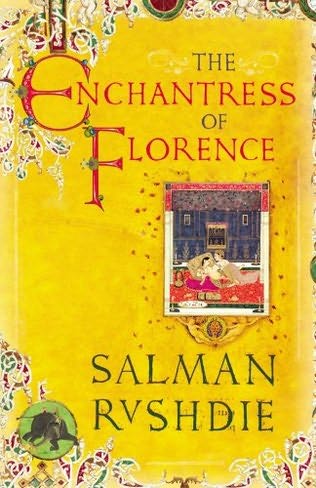Λίγο έλειψε να μη φτάσει ποτέ στο τυπογραφείο το τελευταίο βιβλίο του Σάλμαν Ρούσντι, «The Enchantress of Florence», εκδ. Random («Η γητεύτρα της Φλωρεντίας»). Οταν τον Ιανουάριο του 2007 το πανέμορφο μοντέλο, η Ινδοαμερικανή ηθοποιός και συγγραφέας βιβλίων μαγειρικής Πάντμα Λάκσμι του ζήτησε διαζύγιο, ο συγγραφέας έχασε τον κόσμο κάτω από τα πόδια του. Ισως, τελικά, το κυνήγι που δέχτηκε από τους φανατικούς μουσουλμάνους για τους «Σατανικούς Στίχους» να μπορεί να συγκριθεί με την αναστάτωση που του προκάλεσε ο χωρισμός από την τέταρτη γυναίκα του.
 «Ενιωσα σαν να είχε πέσει πυρηνική βόμβα στο σαλόνι μου», είπε στην «Γκάρντιαν» ο Ρούσντι για το διαζύγιό του με την Πάντμα Λάκσμι |
«Ενιωθα σαν να είχε πέσει πυρηνική βόμβα στο σαλόνι μου», εξομολογήθηκε ο Ρούσντι στον δημοσιογράφο της «Γκάρντιαν», Αντριου Αντονι. «Κάποιες στιγμές φοβήθηκα ότι θα "χάσω" το βιβλίο. Ημουν τόσο πολύ αναστατωμένος. Πάσχιζα εννιά ώρες την ημέρα για έξι βδομάδες να γράψω τρεις σελίδες». Κάποια στιγμή ξαναβρήκε, όμως, τον ενθουσιασμό του για τη συγγραφή. Και τη χρησιμοποίησε ως αντίδοτο στον πόνο του χωρισμού... [
Η εξουσία της γυναικείας ομορφιάς, Του ΓΙΩΡΓΟΥ ΚΑΡΟΥΖΑΚΗ, Ελευθεροτυπία, 8/4/2008]
Ο Salman Rushdie είναι συγγραφέας οκτώ μυθιστορημάτων. Το 1993 Τα παιδιά του μεσονυχτίου θεωρήθηκαν το "Booker of Bookers", το καλύτερο μυθιστόρημα που είχε κερδίσει το βραβείο Booker στα πρώτα 25 χρόνια του βραβείου, και επίσης του απονεμήθηκε το Αυστριακό Κρατικό Βραβείο για την Ευρωπαϊκή Λογοτεχνία. Το The Moor's Last Sigh (Ο τελευταίος στεναγμός του Μουρ) κέρδισε το βραβείο Whitbread το 1995, και το European Union's Aristeion Literary Prize το 1996.
«The Enchantress of Florence»
A tall, yellow-haired young European traveller calling himself 'Mogor dell'Amore', the Mughal of Love, arrives at the court of the real Grand Mughal, the Emperor Akbar, with a tale to tell that begins to obsess the whole imperial capital. The stranger claims to be the child of a lost Mughal princess, the youngest sister of Akbar's grandfather Babar: Qara Koz, 'Lady Black Eyes', a great beauty believed to possess powers of enchantment and sorcery, who is taken captive first by an Uzbek warlord, then by the Shah of Persia, and finally becomes the lover of a certain Argalia, a Florentine soldier of fortune, commander of the armies of the Ottoman Sultan. When Argalia returns home with his Mughal mistress the city is mesmerized by her presence, and much trouble ensues."The Enchantress of Florence" is the story of a woman attempting to command her own destiny in a man's world. It brings together two cities that barely know each other - the hedonistic Mughal capital, in which the brilliant emperor wrestles daily with questions of belief, desire and the treachery of sons, and the equally sensual Florentine world of powerful courtesans, humanist philosophy and inhuman torture, where Argalia's boyhood friend "il Machia" - Niccolr Machiavelli - is learning, the hard way, about the true brutality of power. These two worlds, so far apart, turn out to be uncannily alike, and the enchantments of women hold sway over them both. But is Mogor's story true? And if so, then what happened to the lost princess? And if he's a liar, must he die?
ΒΛΕΠΕ ΚΑΙ:
The real uses of enchantment. Salman Rushdie's sumptuous mixture of history and fable in The Enchantress of Florence is magnificent, says Ursula K Le Guin. Saturday March 29, 2008, The Guardian
The Enchantress of Florence by Salman Rushdie. Reviewed by Peter Kemp, The Sunday Times, March 30, 2008
The Enchantress of Florence by Salman Rushdie. [an overview of the reviews and critical reactions]

No comments:
Post a Comment